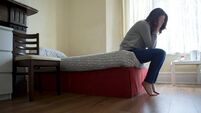Housing minister 'concerned' at how homeless deaths are being reported

Minister for Housing, Local Government and Heritage Darragh O'Brien.
Housing Minister Darragh O'Brien has said that while every death of a homeless person is a tragedy, he was concerned about how the deaths were being reported.
The HSE is currently investigating a sharp increase in the number of deaths of people classified as homeless in the Dublin area last year. A total of 79 people who were either sleeping rough or in contact with the Dublin Regional Homeless Executive (DRHE) died, 30 more than the previous year.














